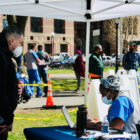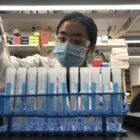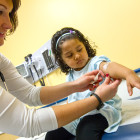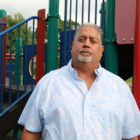Financially Challenged But Fierce, Griffin Hospital Innovates Its Way Through Pandemic
|
Sweating in his black jacket under a brilliant spring sun, Keith J. DuPerry, 40, waited in line on the New Haven Green. Destination: FEMA’s first-in-the-nation COVID-19 mass vaccination trailer, administered by Griffin Hospital of Derby. Earlier that morning, DuPerry had taken a bus from the sober house where he lives to an addiction treatment center downtown. The buzz of activity on the Green—party tents and comfortable seating, trailers custom shrink-wrapped with photos of smiling, diverse, shot-giving caregivers and grateful patients—got him thinking. He returned to the Green after lunch.









